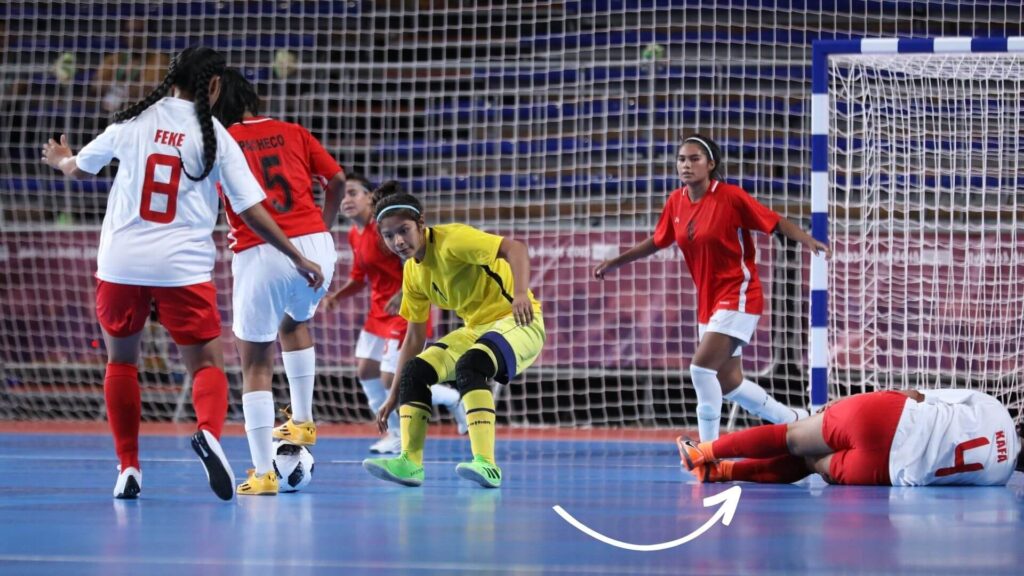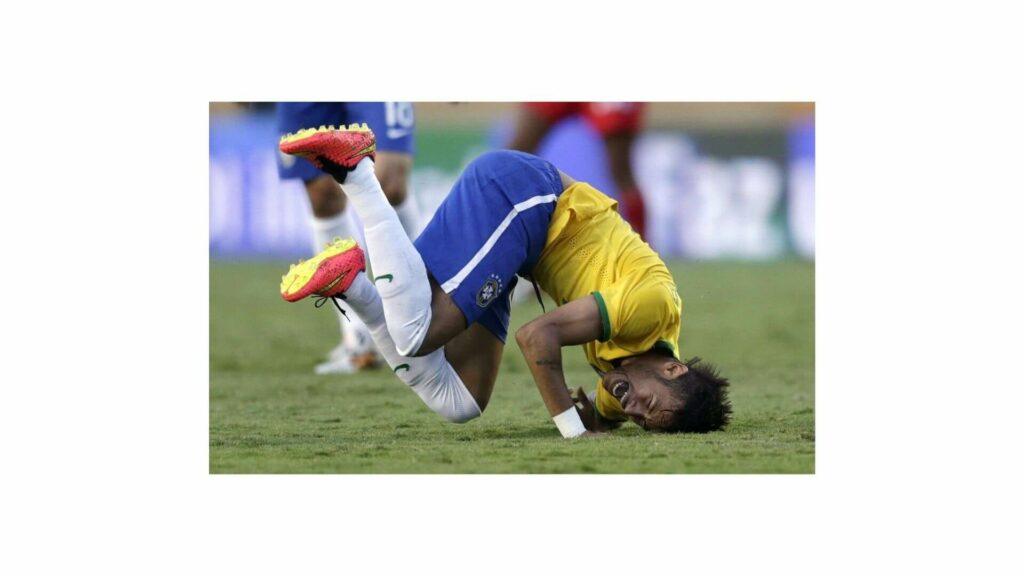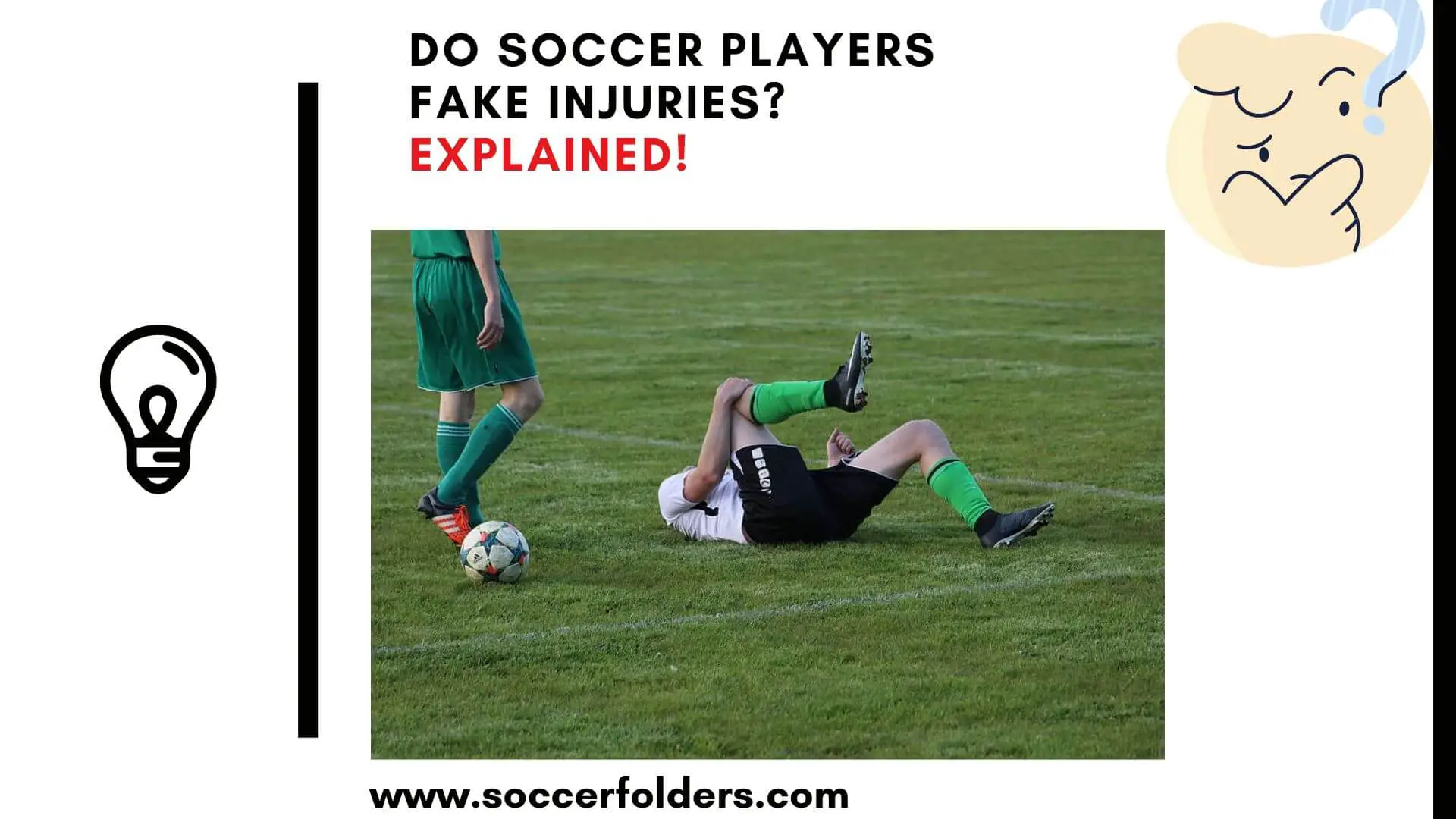Do soccer players fake injuries?
Before answering that question, keep in mind that Soccer(aka football) is a beautiful and exciting game.
But this game is full of flopping, faking, diving, falling on the ground, or crying when you are hit on the leg, and then suddenly getting right back up a few seconds later and running around as if nothing happened.
Now, does it mean they pretend to be hurt? Do soccer players fake injuries?
This is what you are going to find out in this article.
Do Soccer Players Fake Injuries?
Yes, soccer players sometimes fake injuries. Faking injury is a tactic players employ to deceive the referee and gain an advantage for their team. While not all players engage in this behaviour, it is a common practice in the sport.
Although this is a very bad practice used by many soccer players nowadays, nobody condemns this act except the fans who tend to often criticize those actors.
How Do They Pretend To Be Hurt?

This usually occurs when a player goes in contact with another player in a game. The player can pretend to be hurt so the referee will sanction the player who committed the foul.
This can range from dramatic falls to rolling on the ground in apparent pain, only to quickly recover and continue playing.
All the player needs is a slight contact to pretend to be hurt.
This has become a trend in soccer/football and as stated earlier, this is very annoying for the fans who want a game full of skills, sportsmanship, and Fairplay, rather than seeing players rolling on the pitch every time there is contact.
But why do players exaggerate a foul?
Why Do Soccer Players Exaggerate Their Injuries?

Some soccer players will exaggerate a foul or injury either to waste time during a game or sometimes to influence the referee’s decision on a yellow or red card to the opponent.
Let’s explore both ideas to have a better understanding.
1-To Waste Time
This happens a lot in soccer/football where we see the goalkeeper, for example, faking an injury during the last minutes of the game to waste time. This is of course when his team is winning the game.
Although it’s considered an anti-game for a lot of people, players tend to do it more and more.
A recent example is during the African Cup Of Nations in 2022, during a game between Gabon vs Ghana, Ghanaian players were leading 1-0 and started spending long minutes on the ground to waste time. But of course, Karma does exist, and Gabon ended up equalizing.
2-To Influence A Referee’s Decision
Sometimes, even slight contact can make a player exaggerate with the only purpose of the referee to sanction the offender.
Referees tend to be influenced by the severity of a player’s injury. Depending on the severity of the foul, the offender can be sanctioned with a red card. This is exactly what those “exaggerators” want.
Note that sometimes, a player will claim a foul when there was even no contact. They do it mostly when a player already has a yellow card. They try to influence the referee to give a second yellow and therefore, a red.
Usually, teams use their best dribblers to provoke defenders and search for fouls. We often see it with Neymar.
But thankfully, there is a sanction for players diving and faking fouls as well. This sanction results in a yellow card.
Now, there is VAR to notice every single thing happening on a soccer pitch.
Also read: Can you play soccer in the rain?
VAR, The Perfect Solution?
VAR should clean up the game and see a higher quality brain of football with honourable players trying to win through their hard work and talent and not by trying to get penalties and fouls.
Unfortunately, VAR isn’t perfect. It can ruin football fans’ emotions sometimes. Because the reality is football is not just a game.
Imagine scoring a last-minute goal that can allow you to go through. Then, there is a VAR to deny your goal. This will ruin your emotion, but most importantly, the people watching the game. This is the wrong side of VAR.
Plus, VAR is being misused, especially in the UK.
Sometimes, the referee will decide without consulting the VAR. This has caused much frustration in the soccer world.
If the referee decides to award Team A with a penalty, team B has the right to call for VAR if they think that decision is wrong.
Unfortunately, this is not being respected.
A perfect example is during the 2020 European Cup that took place in June 2021. During the semi-final between England vs Denmark, the referee awarded the England team a penalty in extra time. Denmark players contested this decision but the referee still decided to ignore the VAR.
There was no penalty. That was a wrong decision from the referee…
Another example was during the African Cup Of Nations again, Morocco was awarded a penalty against Gabon. Gabonese players requested a VAR check but the referee refused to check.
Once again, this shows some referees do not respect the rules.
Here Is What VAR Could Do Better:
Allow each team to have a limited amount of VAR challenges at their disposal. For example, three.
For instance, let’s say there is a great free-kick right outside the box for team A. And the team that conceded the foul(team B) claims that the player has dived- if the VAR confirms it was not a foul, the player who dived will receive a sanction and the team B will still have their 3 VAR challenges and the team A only 2 challenges.
If VAR confirms that it was a real foul, team B that challenged loses one challenge and has only 2 remaining for the rest of the game.
This will ensure the proper use of VAR and reduce the number of fake injuries, acting, flops, and fouls that go on with football.
So, now that players know they can get challenged on it and potentially receive a yellow card, they might think twice before faking a foul.
Also read: Is pushing allowed in soccer?
Cultural Differences
The prevalence of faking injuries varies across different soccer leagues and countries, often influenced by cultural factors. Some leagues may have a higher tolerance or acceptance of this behaviour, while others prioritize fair play and discourage such actions.
Refereeing Challenges
Referees face significant challenges in distinguishing between genuine injuries and faked ones. The difficulty lies in making accurate judgments in real-time, considering the fast pace of the game and players’ abilities to deceive through acting.
Player Reputation and Public Perception
Players who frequently fake injuries can suffer reputational consequences. Their actions may lead to public perception of dishonesty and a lack of sportsmanship, affecting their standing within the soccer community and among fans.
Player Safety
Faking injuries can have implications for player safety. When genuine injuries are overlooked due to a culture of deception, players may not receive the necessary medical attention, potentially leading to long-term consequences for their well-being.
Fans’ Perspective
Soccer fans have mixed opinions regarding players faking injuries. While some may see it as part of the game’s tactics, others view it as a frustrating and dishonest practice that detracts from their enjoyment of the sport.
Fans’ perceptions of players and teams can be influenced by their behaviour on the field.
Final Thoughts
Soccer is the most popular sport on the planet and one of the best.
These ridiculous fake injuries, dives, flops, fake pain, and childish behaviour on the pitch have to stop. It is a shame for the sport in general and soccer in particular.
With that being said, players should stop pretending and play with passion, love, and for the team and the fans.
Nobody wants to watch a soccer game full of players diving every time there is a charge or contact with another player.
What do you think about soccer players faking injuries or fouls during a game?
Share your ideas in the comment section below and do not hesitate to leave any questions you may have.


